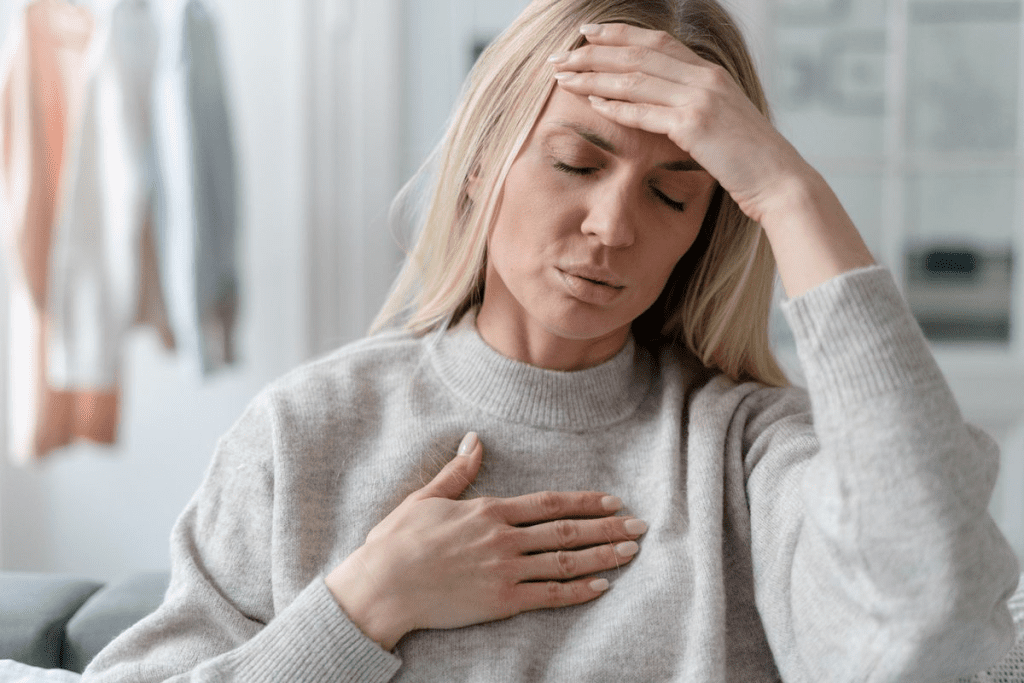We often wonder if sleep disorders are linked to mental health issues or are separate conditions. They need their own focus.
Sleep disorders, like insomnia and sleeping disorders, affect how well we sleep. This can lead to problems during the day and make it hard to function.

About 11.7% of adults have sleep disorder issues. This shows we need to understand how sleep disturbances relate to mental health.
At LivHospital, we know how important it is to tackle sleep disorders. They affect our overall health. Our team works hard to offer new care and support for those dealing with these issues.
Key Takeaways
- Sleep disorders are different from mental illnesses, but they often happen together.
- Insomnia and sleep apnea are among the most common sleep disorders.
- LivHospital provides complete care for sleep disorders.
- It’s key to understand the connection between sleep and mental health.
- Sleep disorders affect a big part of the adult population.
The Distinction Between Sleep Disorders and Mental Illnesses
It’s important to know how sleep disorders and mental illnesses are different. Sleep disorders affect how well and when we sleep. They are not mental illnesses, but they often happen with them.

Clinical Classification of Sleep Disorders
Sleep disorders are grouped based on how they affect our sleep. The Diagnostic and Statistical Manual of Mental Disorders, Fifth Edition, Text Revision helps classify them. It lists disorders like insomnia, sleep apnea, narcolepsy, and restless legs syndrome.
“Sleep disorders are complex conditions that need a detailed diagnosis,” says a sleep specialist. “Getting the right diagnosis is key to finding good treatments.”
Why Sleep Disorders Are Not Technically Mental Illnesses
Sleep disorders and mental illnesses are different, even though they often go together. The main difference is in how they are diagnosed and treated. Sleep disorders deal with sleep problems, while mental illnesses affect mood, thoughts, and behavior.
Sleep disorders can really affect our mental health. For example, long-term insomnia can lead to depression and anxiety. Also, mental health issues can mess with our sleep, creating a cycle between the two.
We need to see that sleep disorders and mental health are connected but different. Taking care of sleep disorders can help our mental health, and the other way around.
5 Ways Sleep and Mental Health Are Interconnected
The link between sleep and mental health is complex. Each affects the other deeply. It’s key to understand this connection for better treatment.
The Bidirectional Relationship
Sleep and mental health have a two-way relationship. “Sleep disorders are not just a symptom of mental health conditions, but they can also be a precursor to the development of these conditions.” For example, insomnia often leads to depression. People with insomnia are more likely to get depressed.
Mental health issues can also mess with sleep. Anxiety, for instance, can make it hard to sleep. This shows we need to treat both sleep and mental health together.
Sleep Deprivation’s Effect on Mental Well-being
Not getting enough sleep hurts our mental health. It makes it hard to focus and make decisions. “Sleep deprivation can also make us more emotionally unstable, raising the risk of mood disorders.” Long-term sleep loss can make anxiety and depression worse.

How Mental Health Conditions Disrupt Sleep Patterns
Mental health issues can mess up our sleep. PTSD, for example, can cause nightmares and flashbacks. This makes it hard to sleep regularly.
“The presence of mental health conditions can lead to changes in sleep architecture, reducing the quality of sleep and further exacerbating mental health symptoms.”
It’s important to understand these disruptions. This helps create better treatment plans for both mental health and sleep issues.
Healthcare providers can make better plans by seeing how sleep and mental health are connected. These plans might include therapy for sleep problems and treatments for mental health issues.
Common Sleep Disorders and Their Prevalence in America
Sleep disorders are a big health issue in America, affecting millions. Over 50 million Americans have chronic sleep disorders. This shows we need to know more and get help.
Insomnia: America’s Most Reported Sleep Problem
Insomnia is the top sleep disorder in the U.S., with one-third of adults showing symptoms. 4-22% of people have insomnia disorder. This is a big health worry. Insomnia can hurt mental health and daily life. Getting help is key to beating insomnia.
Sleep Apnea and Its Mental Health Implications
Sleep apnea is common in America, causing breathing pauses during sleep. It can make sleep poor and lower oxygen levels, affecting mental health. Treating sleep apnea can help mental health. We see sleep apnea as a key factor in mental well-being.
Less Common Sleep Disorders Worth Understanding
While insomnia and sleep apnea are common, other disorders like restless leg syndrome, narcolepsy, and parasomnias also exist. It’s important to know about these less common disorders for better care. We aim to support those with various sleep issues.
By recognizing the many sleep disorders, we can improve sleep health and well-being in America.
Mental Health Conditions Most Affected by Sleep Disorders
Sleep disorders greatly impact mental health, affecting millions globally. The link between sleep and mental health is complex. Sleep issues often make mental health symptoms worse.
Depression and Insomnia: A Significant Connection
Depression and insomnia are closely related. Studies show that 51.4% of people with depression also have insomnia. This creates a cycle where depression worsens sleep, and poor sleep makes depression worse.
Insomnia in those with depression can make treatment harder. It may lead to a longer recovery and a higher risk of relapse. So, treating sleep issues is key in managing depression.
Anxiety Disorders and Sleep: A High Comorbidity Rate
Anxiety disorders and sleep problems are also closely linked, with a rate of 48.2%. People with anxiety often find it hard to fall or stay asleep because of stress and high alertness.
Managing anxiety disorders well means looking at sleep, too. Poor sleep can make anxiety symptoms worse. Treating sleep issues can help improve outcomes for those with anxiety.
Bipolar Disorder and Schizophrenia: High-Risk Groups
People with bipolar disorder and schizophrenia are at high risk for sleep disorders. Research shows sleep problems are common in these groups. They can even trigger episodes of mania or psychosis.
The high rate of sleep disorders in these conditions highlights the need for full care. Care that addresses both mental health and sleep is essential. This approach can improve patient outcomes and quality of life.
Conclusion: Treating Both for Better Overall Health
Treating sleep disorders and mental health conditions is key to overall well-being. By tackling both, people can see big improvements in their quality. At LivHospital, we know how sleep and mental health are connected. Our team offers a complete care plan.
Fixing sleep issues starts with a detailed look at a person’s sleep history. We might use light therapy, relaxation methods, or medicine. Mixing these with mental health care gives our patients a full health plan. Our focus on patient needs makes us stand out in healthcare.
Choosing LivHospital means getting top-notch care for sleep and mental health issues. We’re here to support and guide you every step of the way. Our goal is to help you get the best results possible.
FAQ
What are sleep disorders, and are they considered mental illnesses?
Sleep disorders affect how well and when we sleep. They are linked to mental health but aren’t called mental illnesses by the DSM-5-TR. Yet, they can really impact our mental well-being.
How are sleep disorders and mental health interconnected?
Sleep disorders and mental health go hand in hand. Sleep problems can lead to mental health issues, and mental health issues can mess with our sleep. For example, insomnia might make someone more likely to get depressed.
What are the most common sleep disorders in America?
In America, insomnia and sleep apnea are the top sleep disorders. Insomnia makes it hard to fall or stay asleep. Sleep apnea causes breathing to stop during sleep.
How do sleep disorders affect mental health conditions like depression and anxiety?
Sleep disorders can make depression and anxiety worse. People with insomnia are more likely to get depressed. Those with anxiety often have trouble sleeping.
Can treating sleep disorders improve mental health outcomes?
Yes, treating sleep disorders can help mental health. Fixing sleep issues can lower the risk of getting other mental health problems. It can also make people feel better overall.
What kind of care does LivHospital provide for sleep disorders and mental health conditions?
LivHospital offers top-notch care for sleep and mental health issues. Our services are designed to help patients from around the world. We make sure they get the care they need to manage their conditions well.
How prevalent are sleep disorders among adults?
About 11.7% of adults have sleep disorders. This shows how important it is to tackle these issues for better health.
Are there any less common sleep disorders that are worth understanding?
Yes, there are rarer sleep disorders like restless leg syndrome and narcolepsy. Knowing about these can help people get the right treatment.
References
- Thorpy, M. J. (2012). Classification of sleep disorders.Neurology and Therapy, 1(1), 1-20.


































